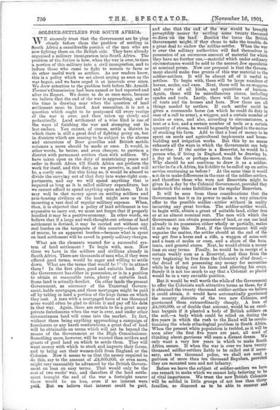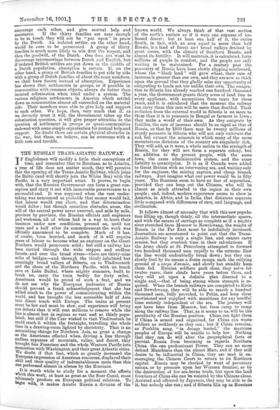SOLDIER-SETTLERS FOR SOUTH AFRICA.
NIE-T E sincerely trust that the Government are ke ping V V clearly before them the problem of settling in South Africa a considerable portion of the men who are now fighting there on the British side. They have already organised a military immigration into South Africa.: The problem of the future is how, when the- war is over, to turn a- portion 'of this military into a civil immigration,- and to induce those who came to fight to remain to farm or do other useful work as settlers. As our readers know, this is a policy which we set about urging as soon as the war began, and we have urged it at intervals ever since. We drew attention to the problem both before Mr. Arnold- Vorster's Commission had been named or had reported and after its Report. We desire to do so once more, because we believe that the end of the war is approaching, and so the time is drawine near when the question of land settlement must be °faced. And remember, it is not a question which ought to be postponed till' every vestige of the war is over, and then taken up slowly and pedantically. Land settlement of a wise kind is one of the ways of finishing the war and stamping out its "last embers. You cannot, of course, settle a district in which there is still a great deal of fighting going on, but in districts which are ceasing to be subject to the alarms and excursions of Boer guerillas and British mobile columns a move should be made at once. It would, in other words, be better, and even cheaper, to garrison a district with permanent settlers than with soldiers. We have taken upon us the duty of maintaining peace and order in South Africa till South Africa can perform the work for itself, and this duty, as we perceive, is, and will be, a costly one. But this being so, it would be absurd to divide the carrying out of that duty into water-tight com- partments, and say we will spend anything that is required as long as it is called military expenditure, but we cannot afford to spend anything upon settlers. Yet it may well be that money spent on settling soldiers and arm-bearing civilians on the land might save us from incurring a vast deal of regular military expense. When, then, it is objected that a policy of land settlement is too expensive to carry out, we must not forget that if properly handled it may be a positive economy. In other words, we believe that if a large and well-thought-out scheme of land settlement is devised, it may be carried out without any real burden on the taxpayers of this country—there will, of course, be an apparent burden—because what is spent on land settlement will be saved in purely military charges.
What are the elements wanted for a successful sys- tem of land settlement ? To begin with, men. Now these we have in the soldiers and civilians already in South Africa. There are thousands of men who, if they were offered good terms, would be eager and willing to settle down. What are the terms that would be IP-ely to attract them ? In the first place, good and suitable land. But the Government has either in possession, or is in asition to obtain at reasonable rates, plenty of suitablepo land. Some land is actually derelict. On other lands *present Government, as successor of the Transvaal aovern; went, holds mortgages, and these mortgages might be paid off by taking in land a portion of the huge farms on which they rest. A man with a mortgaged farm of ten thousand acres would often be glad to divide it and pay off his debt in that way. Again, there are certain to be a great many private foreclosures when the war is over, and under other circumstances land will come into the market. In fact, without there being anything approaching a campaign of foreclosure or any harsh confiscations, a great deal of land will be obtainable on terms which will not be beyond the means of the Government or the High Commissioner. Something more, however, will be wanted than settlers and grants of good land on which to settle them. They will want money with which to stock and improve their farms, and to bring out their women-folk from England or the Colonies. • Now it seems to us that the money required to do this, say to the amount of .P..4,000,000, or even more, might very reasonably be advanced by the British Govern- ment on loan on easy terms. That would only be the cost of two weeks' war, and therefore if the land settle- ment brought the end of the war a fortnight nearer there would be no loss, even if no interest were paid. But we believe that interest could be paid, and also that -the end orffie---viii--*Ould be broughi perceptibly nearer by settling • Seine twenty thousand so dyers on the land. Besides the loans the British Government might,' if-' they chose to take the trouble, do a great deal to endow the soldier-settler. When the war is over the military authorities will find themselves in possession of_ an enormous amount of material for which they have no further ute,—material which under ordinary circumstances would be sold to the nearest Jew specelator at nominal prices. Now our proposal is that the Govern- ment should make free grants of this war material to the soldier-settlers. It will be almost all of it useful to settlers. To 'begin with, there will be large- numbers of horses, mules, and oxen. Next, there will be ox-waggons and carts of all kinds, and quantities of harness. Again, there will be miscellaneous stores, including spades and tools. Lastly, there will be vast numbers of tents and tin houses and huts. Now these are all things needed by settlers. If each settler could be given a commando horse (on which he could do thity in case of a call to-arms), a waggon, and a certain number of mules or oxen, and also, according to circumstances, a tent or a hut, and a certain number of tools or a certain quantity of stores, he would be greatly helped in the matter of stocking his farm. Add to that a loan of money to be spent on seeds and agricultural implements and house- building and irrigation works. But this by no means exhausts all the ways in which the Government can help the settler. - If the -settler is a Reservist, he would be a person who, if living in England, would be drawing ls. a day at least,' or perhaps more, from the Government. Why should he not continue to draw_ it as a soldier- settler in So Uh Africa, his liability to be called up on active service continuing as before ? At the same time it would not do to make differences in the case of the soldier-settlers, and therefore those _who were not .Reservists might be given ls. a day by the Colonial Government, provided they undertook the same liabilities as the regular Reservists.
It will be seen from these considerations that the Government has it in its power to make a very attractive offer to the "possible soldier - settler without in reality incurring any- great burden. The soldier-settler would, to begin with, obtain a grant of suitable land, either free or at an almost nominal rent. The ease with which the Government can obtain possession of land, or can use land already in its possession either wholly or partially, makei it safe to say this. Next, if the Government will only organise the matter, the settler should 'at the end of the war get free a horse and a rifle, a waggon of some sort and a team of •mules or oxen, and a share of the huts, tents, and general stores. Next, he would obtain a money loan on easy terms. Finally, he would be in receipt of a certain weekly sum as a Reservist, and thus from the very beginning be free from the Colonist's chief dread,— the dread of not _possessing any money for necessities while he is laying out his farm and planting his crops. Surely it is not too much to say that a Colonist so placed would be in a very enviable position.
But it would be well worth the while of the Government to offer the Colonists such attractive terms as these,-for if it obtained the twenty thousand soldier-settlers we believe it could obtain, it would have automatically garrisoned the country districts of the two, Colonies, and garrisoned them ixtraOrdinarily ceaply. A loan of X4,000,000, or of double that amonnt, would be an excel- lent bargain if it planted a body of British soldiers on the soil,--a body which could be relied on during the five years in which the rush to the Rand will be revolu- tionising the whole ethnological problem in South Africa. When the present'white population is trebled, as it will be soon after the first five years are past, all need of thinking about garrisons will seem a distant dream. We only want a very fete years in which' to make South Africa secure. If when the war is over we have twenty thousand soldier-settlers liable to be called out if neces- sary, and ten thousand police, we shall - not need a garrison of, more than ten thousand Regulars, provided they are mounted men and not infantry. Before we leave the subject of soldier-settlers we have one remark to make which we cannot help believing to be of vital importance. We trust the new British Colonists will be settled in little groups of not less than thirty families, so disposed as to be able to succour and encourage each other, and give mutual help and assistance. If the thirty families are near enough to be in touch they will not be "put upon" in peace by the Dutch. An isolated settler, on the other hand, would be sure to be persecuted. A group of thirty families is much more likely to win first the respect, and then the goodwill, of the Dutch. One does not want to discourage intermarriage between Dutch and English, but if isolated British settlers are put down in the middle of a Dutch population, absorption is certain. If, on the other hand, a group of British families is put side by side with a group of Dutch families of about the same numbers, we shall have fusion instead of absorption. Experience has shown that settlements in groups, or if possible in communities with common objects, always do better than isolated colonisation when tried under a system. The various religious settlements in America which settled down as communities almost all succeeded on the material side. Their members were able to give help and support to each other. We hope, then, very much that if, as we devoutly trust it will, the Government takes up the colonisation question, it will give proper attention to the question of settlement in groups or quasi-communities endowed with some simple organisation for mutual help and support. No doubt there are certain physical obstacles in the way, but these, we believe, can be overcome with a little care and trouble.



























































 Previous page
Previous page